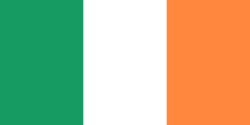| Ireland at the 2017 Summer Universiade | |
|---|---|
 | |
| IOC code | IRL |
| NOC | National Olympic Committee of Ireland |
| in Taipei, Taiwan 19 – 30 August 2017 | |
| Competitors | 63 in 4 sports |
| Medals Ranked 41st |
|
| Summer Universiade appearances | |
Ireland participated at the 2017 Summer Universiade , in Taipei, Taiwan.